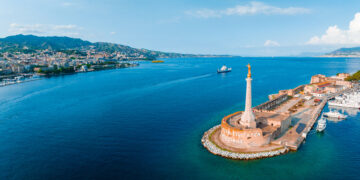Contents
Questo articolo è disponibile anche in:
At the prestigious University of Manouba in Tunisia, the first university chair dedicated to the study of the Sicilian language has been created, officially recognizing it as a full-fledged language.
Thanks to the initiative of Professor Alfonso Campisi, a native of Trapani and a professor of Italian and Romance Philology, this discipline has found a place in the Faculty of Languages since 2016, with the founding of the “Sicily Chair for the Dialogue of Cultures and Civilizations.” The chair is named after the writer Vincenzo Consolo from Messina, in honor of his commitment to preserving Sicilian traditions and language.
Alfonso Campisi: A Passion for Sicily and Mediterranean Culture
Alfonso Campisi is currently a tenured professor at the University of Manouba. Born in Trapani, he studied at the University of Palermo and continued his studies in France, where he earned his doctorate. In 1997, he was offered a two-year position as an Italian language lecturer in Tunisia. Renewed year after year, his role became permanent, and he has now lived in Tunisia for over 25 years. Campisi is known for his research on migratory movements in the Mediterranean and serves as president of the Scientific Council of the Sicilian Language Academy and of AISLLI-UNESCO.

His connection to Tunisia is a return to his roots: his family history is tied to the wave of Italian migration to Tunisia in the 19th century, when around 105,000 Italians—mostly Sicilians—moved to the country in search of work opportunities. Some of his ancestors were part of this migration.
The International Recognition of the Sicilian Language
Although Sicilian is now officially recognized as a language, complete with its own ISO code, many still consider it merely a regional dialect. However, thanks to scholars like Campisi, there is a growing effort to shift this perception and promote it as a serious and legitimate field of academic study.
In addition to the University of Manouba, the University of Pennsylvania in Philadelphia also includes credits related to the Sicilian language and culture within its Italian curriculum. The program presents and celebrates Sicily as a “crossroads of cultures and artistic movements”. The course includes conversations with native speakers, interactive lessons, and in-depth explorations of historical and linguistic aspects.
Currently, these two institutions are the only ones in the world offering academic studies on the Sicilian language.
A Comprehensive Academic Path on Sicilian Culture
With the creation of the first Sicilian language chair, Professor Campisi has stated his goal of fostering intercultural dialogue between the two shores of the Mediterranean. The course on Sicilian culture is intended for fourth- and fifth-year students, equivalent to a master’s degree program in Italy. Students not only learn the language but also delve into the history of Sicilian migration, anthropology, folklore, and culture.

Professor Campisi has gone beyond oral teaching by writing a Sicilian grammar manual adopted by the faculty: Mparamu lu sicilianu, created in collaboration with Gaetano Cipolla, a native of Francavilla di Sicilia and retired professor of Italian at St. John’s University in New York City.
Students also participated in the docu-film Siciliani d’Africa – Tunisia terra promessa, produced by Campisi along with Marcello Bivona. In the film, students speak Sicilian, putting into practice what they have learned in their academic journey. The documentary explores the roots of the Sicilian community in Tunisia, recounting stories of migration, integration, and identity.
The active participation of students enriches the project, demonstrating Professor Campisi’s innovative approach and commitment to teaching Sicilian culture. In an era where intercultural dialogue is increasingly essential, the chair and its related initiatives show how the study of languages and cultures can serve as a bridge between peoples, helping rediscover and celebrate shared histories.














